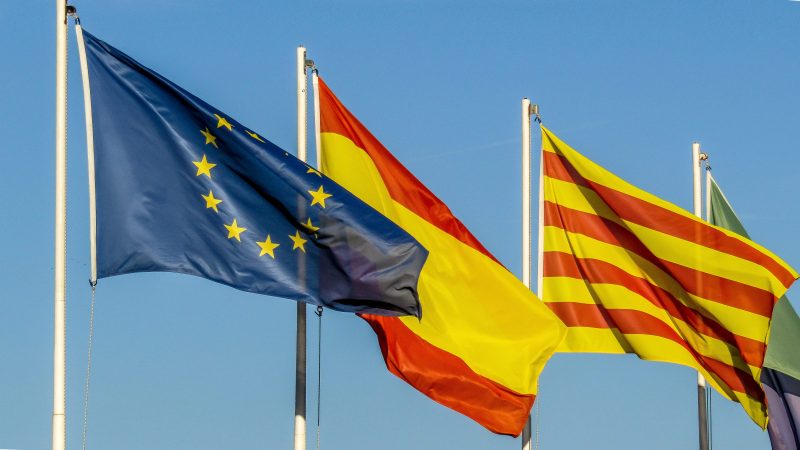The presidency of the Council of the European Union is a very important opportunity for the country that holds the presidency. Spain is going to hold this presidency for the fifth time. The progressive government formed by the coalition of PSOE (Spanish socialist party) and Podemos (extreme left) will assume the presidency in the middle of 2023, that is why it is important to bring to the forefront what the challenges and objectives of the Spanish EU presidency will be. For this, Sergio Velasco interviewed Jorge González-Gallarza, co-host of the Uncommon Decency podcast on European issues and visiting fellow at Mathias Corvinus Collegium (MCC) in Budapest.
What are the Spanish government’s priorities for the objectives and joint programs to be set out in the 18-month program of the Trio Presidency?
It’s hard to know this soon. There are two documents awaiting publication—both the Spanish government’s position towards the EU Council Presidency and the trio’s joint position. Although neither document has been published yet, some of the broad outlines of what Spain will pursue are easy to conjecture. Where neoliberal governments tend to favor issues like competitiveness or improving the business climate, left-wing ones tend to favor climate change and social issues like employment, dependency, or education.
In addition to all of these areas, it is highly probable the Spanish government will include some language about strengthening the EU’s ties with Latin America, which is a long-standing and cross-partisan priority in Spain.
In your recent testimony before a committee in the Spanish parliament on this subject, you exposed the points that Spain should make in the next presidency of the EU. Could you summarize what they were and why you consider them important?
Partly out of the time constraint (I was merely allotted ten minutes for an initial round of remarks before the Q&A with the assembled MPs), I chose to spotlight three areas where I know Spain’s left-wing government will be unlikely to act on, but where I think action would be in the national interest. Firstly, I urged the government to neuter the European Commission’s use of the conditionality regulation, a mechanism approved by the EU Council in 2020 that allows the Commission to pare back funds from a member state it deems to have infringed upon rule-of-law. Secondly, I impelled the government to protect unanimity as the default rule for most major decisions at the EU Council, thereby halting the effort by France and Germany to move towards Qualified Majority Voting (QMV). And finally, I laid out the case for a new asylum and migration framework to better distribute the inflow of asylum-seekers across the EU, which would help alleviate the burden on Spain’s borders.
Which parties were in favor, and which were against? Can you imagine why?
My testimony was (unsurprisingly perhaps) rather well received by Vox’s MP in the committee, José María Sánchez García. It aroused interest and curiosity from the PP’s representative and it drew scorn and criticism from most everyone else. The representative of the pro-independence Basque nationalist party PNV labeled me a “far-right voice”, whilst those from the socialist party did not appreciate my claim that the government likes to indulge in high-stakes diplomatic scenography. Some of the remaining MPs were either absent or refrained from questioning me or engaging with my remarks.
Again, in reference to your recent conference in the committee, you mentioned that the Spanish government formed by PSOE and Podemos could use this EU Presidency as a “showcase” or as publicity. Could you explain why you might believe this to be the case?
Spain is headed for a national election in December, right around the time when the government will be wrapping up its Presidency of the EU Council.
Therefore, it is neither far-fetched nor unlikely to conjecture that Pedro Sánchez, the incumbent PM, will highlight some of his government’s achievements at the EU Council and run on them before the Spanish electorate, casting PSOE as a party that can be trusted to govern at the highest levels.
Additionally, Sánchez’s government has proved to be a big fan of this kind of high-stakes showmanship before, such as when Spain hosted the last NATO meeting that approved the alliance’s new strategic concept.
How does the Spanish side see cooperation with the Hungarian side on the Presidency program? Where, on what issues, could there be a spectacular difference in approach between the countries holding the Presidency?
I think both governments will default, by necessity, to cooperation in some way or form. They simply must.
After all, this trio of presidencies (Spain, then Belgium, then Hungary) will be the last of the current institutional cycle, with elections to the European Parliament scheduled for May 2024 that will very probably alter the colors of Brussels.
Therefore, the expectations run high that this last trio will be able to see a whole slate of pending initiatives through to completion. The animus between Pedro Sánchez and Viktor Orbán, however, is evident. And while Sánchez is unlikely to side shoulder-to-shoulder with the frugal countries on pressing for the application of the Commission’s conditionality regulation to Hungary, it surely has little incentive to press for the opposite either.
Opposing the ambitions of the Hungarian government is a knee-jerk reaction in Brussels. Is there any degree of aloofness on the part of Spain towards Hungary? What are the signs of this?
I think even more than a dislike of Orbán’s politics informed by their own progressive views, the ministers in the Spanish government likely view Hungary as an eastern backwater not worth considering too attentively. I think this has also largely been the stance of other EU leaders towards Orbán’s government, and frankly, it is a disgrace.
Currently, the Commission’s spat with Poland over rule of law has considerably softened whereas that with Hungary has anything but intensified, and that is hardly due to the two countries’ differing stance toward welcoming Ukrainian refugees alone.
It has to do with the importance accorded to each country: whereas Poland is seen as a major military power and a key player in EU dynamics, Hungary is oftentimes (though its stances are resented) dismissed as unimportant.
One area of disagreement within the trio presidency could be the development of the rule of law framework. Given the ongoing disputes with Hungary on the rule of law, what ambitions does the Spanish presidency have to improve the rule of law framework (conditionality procedure, annual reports) and to take forward the ongoing procedures, centered around Article 7?
My hope is that the rule of law conditionality mechanism—the tool approved at the EU Council in 2020, with the support of Hungary and Poland, that allows the Commission to withhold funds intended for countries it deems to have infringed upon rule of law—will be muted throughout Spain’s presidency, that it will remain in place but not be used.
Meanwhile, the Commission will continue its annual work compiling information and recommendations on rule of law as part of its so-called conditionality mechanism, which is an altogether different tool. I don’t think my hope is unrealistic. If Pedro Sánchez thinks strategically about his own self-interest, he will realize that the mechanism that is currently being applied against Hungary and Poland could one day be used against him.
The past year has seen the issue of rule of law heat up in Spain, with both PP and Vox – the two main parties in opposition – accusing the government of thwarting constitutional norms and undermining the separation of powers.
Sánchez has tailored a reform of the penal code to please his coalition allies from Catalonia, some of whom have been trialed for sedition, an offence that Sánchez has scrapped.
Additionally, Sánchez has lowered the threshold for appointing judges to the Constitutional Tribunal. It is true, however, that Vox has been loath to involve the EU in its crusade against Sánchez’s court-packing, and that is because it deems the judiciary branch to be an area of exclusive national sovereignty. Nevertheless, the issue will continue heating up, and Sánchez should be weary of what the EU could potentially do to make him cave.
It is expected that the Spanish Foreign Minister José Manuel Albares Bueno and the Spanish Secretary of State for European Affairs Pascual Ignacio Navarro Ríos will play an important role during the Spanish Presidency. What is worth knowing about them and their approach to EU issues?
Both are career diplomats with impeccable credentials and extensive experience at the embassy, multilateral institution, and European levels. As such, they both have an acute sense of the national interest (ragione di stato). Albares is an extremely talented public speaker, and both speak French and English fluently, as most career diplomats do.
I think both will give their all to the aim of turning Spain’s presidency into an opportunity to advance both the national interest and the broader European interest, however those are conceived.
Jorge González-Gallarza co-hosts the Uncommon Decency podcast on European issues and serves as visiting fellow at Mathias Corvinus Collegium (MCC) in Budapest. His writing on economic and foreign policy has featured in The Wall Street Journal, Newsweek, The New York Post, National Review, The American Conservative, City Journal, The Critic and other outlets. Through the Charles Koch Institute’s (CKI) associate program, he previously held policy roles at e21—the Manhattan Institute’s (MI) economic policy shop in Washington D.C.—and at Americans for Prosperity (AFP). Before that, he had been seconded to Senator Steve Daines’ [R-MT] office on a transatlantic fellowship.







